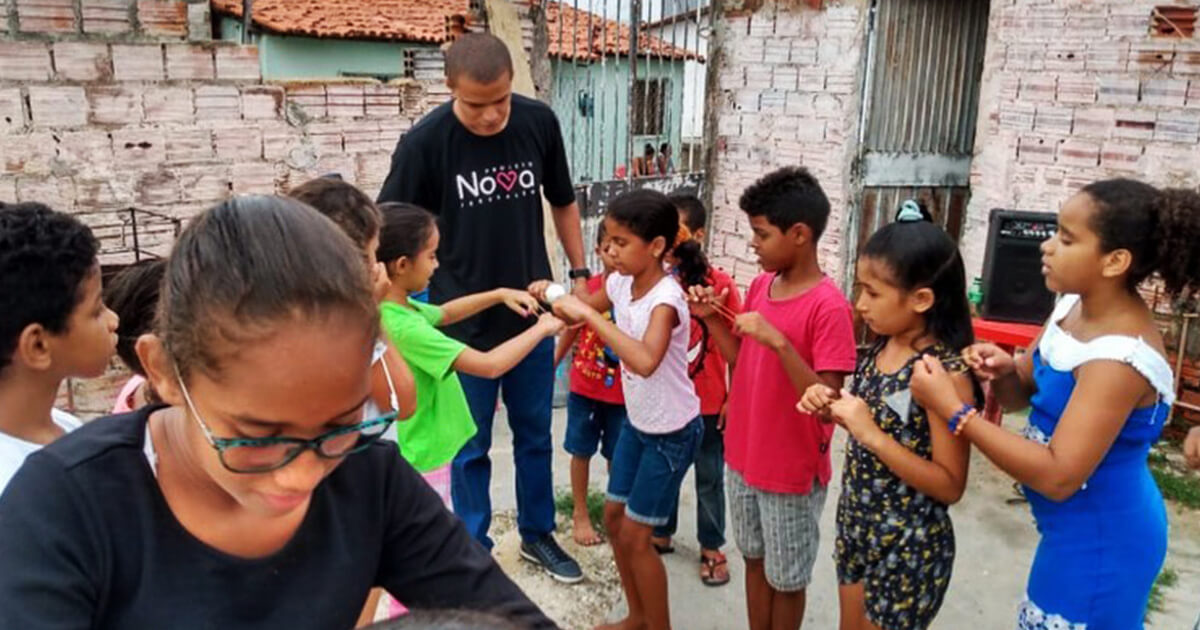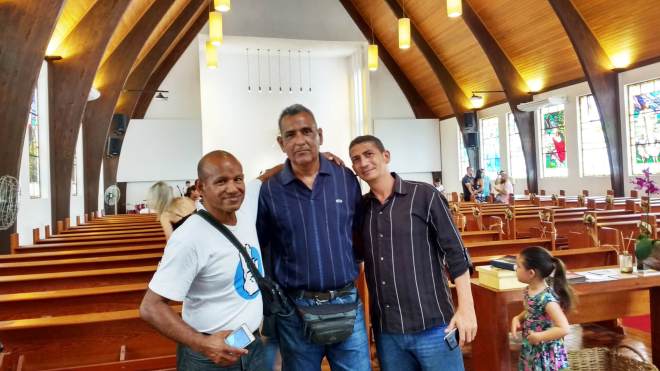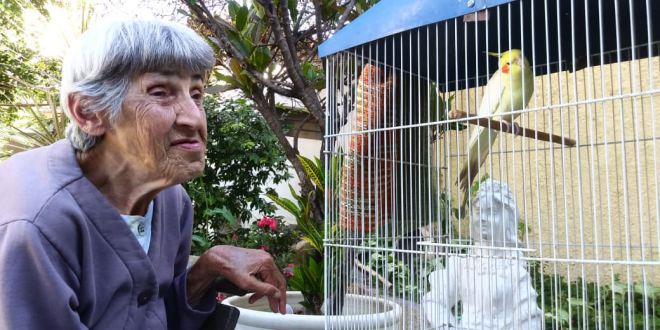UMCOR COVID-19 grants in Brazil reach isolated communities

By Christie R. House
July 2020 | ATLANTA
Seven ministry partners across Brazil have received United Methodist Committee on Relief COVID-19 Sheltering in Love grants to extend their caring outreach deeper into their communities. In a coordinated effort, through the Life and Mission ministry of the national Methodist Church in Brazil, Methodist congregations accompany vulnerable people through the COVID-19 pandemic. In a country without a coordinated government strategy to combat the spread of the novel coronavirus, outreach from a Methodist church may be the only help some of these communities receive.
Transmission rates of COVID-19 are currently climbing in Brazil. At the end of June, the country had 1.35 million confirmed cases and 57,658 deaths. The Rev. Joana D’Arc Meireles, the national secretary for the Life and Mission ministry, describes the climate in Brazil as “terrifying.”
“People are suffering,” Meireles explained in a video interview with Global Ministries’ general secretary, Thomas Kemper. “We have hunger and unemployment and many sick people right now, and not everyone has access to good health care. For this reason, the Methodist church and other churches in Brazil have united to plan ways that we can be more relevant in solidarity to address this situation in Brazil,” she said.
The Methodist Church provides general orientation and guidelines on COVID-19 prevention and social distancing online. It posts official resources, such as liturgy for funerals, pastoral letters and other support for local congregations. At present, all Methodist church buildings are closed for in-person worship and congregations are meeting virtually.
Yet, some congregations continue and even increase their social justice and outreach ministries. With assistance from United Methodist grants through the UMCOR COVID-19 Fund, more people are finding help in chaotic and uncertain times.

PHOTO: PAULO BRUHN
Reaching at-risk and forgotten communities
In the city of Teresina in Piauí, Northeast Brazil, Teresina Methodist Church has worked for several years to reach an underserved community in a place called Jerusalem.
Raquel Gonçalves Da Silva Filgueira Rocha, a graduate student in psychology, leads the Social Action team at the church.
Rocha describes Jerusalem as a dangerous place for outsiders. “Our outreach started by offering soup for people, many of whom are addicted to drugs. And then, someone from that community invited us to come in.”
This was the beginning of Homes of Peace, a ministry focused on ways to improve the lives of children in Jerusalem by strengthening families. They started with a small group and the numbers grew large enough to begin a weekly program.
An UMCOR grant will help the Teresina Methodists provide hygiene kits, COVID-19 prevention guidelines and basic food baskets.
“The community isn’t really concerned about the virus,” Rocha noted. “They lack basic information and little protection is available. What we know is that a lot of people are affected by COVID-19 here. Some have died. Some families are isolating themselves, but many are not.”
The church registered 40 families for the COVID-19 outreach, which they named “Project New Jerusalem Against COVID.”
Another project grant for Northeast Brazil, in Paraíba, serves a hidden community through the João Pessoa Methodist Church.
The congregation is gathering volunteers to put together hygiene kits in partnership with a Brazilian LGBT association, to serve sex workers in the area. “We have been trying to help these women to keep their dignity, their health and hygiene in these times,” Meireles, noted.
In Piracicaba, São Paulo, the Methodist-founded Betel Social Assistance Association is a nursing home with 80 residents and 77 employees. It reports 86 cases of COVID-19 among residents and staff and eight deaths. An UMCOR grant will help to save lives by providing COVID-19 testing and strict adherence to new guidelines.
A grant for a project in Campina Grande, Paraíba, supports health professionals and their families as they take risks to contain the virus.
In the region of Barra do Ceará on the outskirts of Fortaleza, a family-to-family project called Five Loaves of Bread and Two Fish takes shape. In this unique program, the Fortaleza Methodist Church has matched five families, whose adult members are still employed, with two other families each, who have lost their jobs during quarantine. So together, the five families will accompany 10 other families through the pandemic.
The multiplication of resources is a common theme in the Brazilian church.

PHOTO: BSAA
Solidarity with immigrant communities
In Rio Grande do Sul, Methodists accompany Haitian immigrants as they adapt to life in Brazil. The Methodist Church appointed Duplan Daniel, who came from Haiti to study, as a missionary pastor with the Haitian community in Canoas.
During quarantine, many Haitian immigrants lost their jobs, and some moved in with other families. Tight quarters often become a breeding ground for disease. Therefore, rent assistance, which helps families stay in their homes, is a priority. Daniel’s team also prepares food baskets for emergency relief.
But Daniel says they will use a portion of their UMCOR grant to invest in livelihood work.
“Even though you have provided me with fish today, you need to teach me how to fish,” Daniel explained. “We will buy two or three sewing machines to teach a group of young men and women to make masks. This will help them and their families, but they can also sell masks. These new skills are an investment in the future, after the pandemic moves on.”
In Porto Alegre, Congregation Wesley of the Methodist Church in Brazil conducts an ongoing resettlement ministry. Recent years have seen an influx of migrants from Venezuela, who face hardship during Venezuela’s political crisis.
Paulo Roberto Lima Bruhn, a member of Congregation Wesley, remembers the first three Venezuelans who visited the church in 2018. David, Christian and Josef appeared one Sunday from Esteio, a nearby community. They had encountered Methodists in Boa Vista, a city much closer to the Venezuelan border. Once the Brazilian government resettled them in Esteio, they wanted to find a Methodist Church. They came even though they had little money for transportation, because they recognized the name “Wesley.”
“That’s when we began the work of accompaniment,” Bruhn said, “seeking to meet the various needs in each of their lives.”
Since 2018, the national Methodist Church has formalized a structured program for taking in Venezuelans in Boa Vista and sending them to Methodist churches in other parts of the country for resettlement. Bruhn is in weekly contact with the coordinators of the migrant welcome program at Boa Vista Methodist Church.
Wesley Congregation discovered that the three men were separated from their families, who were in dire need either back in Venezuela or in Boa Vista. Over time, they brought the wives and children of all three men. Then came brothers and sisters and their families. Many came sick and hungry, with only the clothes on their backs. Congregation Wesley has since resettled about 150 people.
The UMCOR grant will help 15 families, about 60 people, with rent assistance so they can stay in their homes during quarantine.
Though it is difficult for a church of 200 members to support such a ministry, Bruhn has a theory about how it becomes possible.
“My understanding, when we go out in mission, is that God will give us the vision. For me this is very important – that this work is related to people whom God has entrusted to us. When we trust in God, God sends us people and the ability to help, to participate in God’s work.”
Christie R. House is a consulting writer and editor with Global Ministries. Interview translation provided by Donald Reasoner.
For more information:
An earlier story about the work of the Boa Vista United Methodist Church can be found here: https://www.umcmission.org/share-our-work/news-stories/2019/june/methodist-church-of-brazil-welcomes-migrants-shade-and-fresh-water
Note that some of the images used in this piece were taken before the COVID-19 pandemic hit and might not reflect the proper use of masks and the practice of social distancing.

